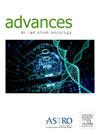Characterizing Wellness Initiatives in Academic Radiation Oncology Departments
IF 2.2
Q3 ONCOLOGY
引用次数: 0
Abstract
Purpose
Burnout is prevalent in radiation oncology (RO), and an increased focus on promoting physician wellness and formalizing wellness-directed efforts has transpired in recent years. We aimed to characterize current wellness leadership positions and efforts within academic RO departments.
Methods and Materials
Academic RO department chairs were contacted to inquire whether they had a departmental wellness leader with a request for leader contact information, if applicable. Wellness leaders were invited to complete an anonymous survey in January and February 2023 using Qualtrics. Questions assessed leader demographic characteristics, role structure and resources, current initiatives, and impacts to date. Descriptive statistics and summaries of free-text responses are reported.
Results
A total of 120 chairs were contacted. In total, 71 (59%) responded, with 43 (61%) having departmental wellness leaders, of which 17 (39.5%) responded, to the survey. A total of 70.6% were female, and 76.5% were physician faculty. Most respondents were early-career. The most common previously implemented initiatives included offering programming and education (33.3%) and improved access to mental health services (25%). The most common active initiatives include conducting studies to address root causes of burnout (41.7%), developing specific wellness goals (25%), performing a review of policies that encourage prolonged work hours (25%), and offering programming and education (25%). Challenges included limited bandwidth (66.7%), lack of funding (41.7%), and lack of departmental interest in organizing or attending events (33.3%). Leaders highlight the importance of a dedicated individual to tangibly implement changes and the unique opportunity of someone within RO to understand the specific challenges faced by those in our field.
Conclusions
Wellness leadership roles exist in many RO departments. As evidenced by a limited number of fully implemented initiatives, these roles are new and evolving. A focus on wellness has the potential to bring positive change to departments; however, the impact of newly established wellness roles on culture and balance requires longitudinal followup.
学术放射肿瘤学部门健康倡议的特征。
目的:职业倦怠在放射肿瘤学(RO)中很普遍,近年来,人们越来越关注促进医生健康,并将健康导向的努力正式化。我们的目的是描述当前的健康领导职位和学术RO部门的努力。方法和材料:联系了学术RO部门主席,询问他们是否有部门健康领导,并要求提供领导的联系信息,如果适用的话。健康领导者被邀请在2023年1月和2月使用Qualtrics完成一项匿名调查。问题评估了领导者的人口特征、角色结构和资源、当前的举措和迄今为止的影响。报告了描述性统计数据和自由文本回复摘要。结果:共联系了120位椅子。共有71间(59%)受访,其中43间(61%)设有部门健康主管,其中17间(39.5%)作出回应。其中70.6%为女性,76.5%为内科教师。大多数受访者都是职场新人。以前实施的最常见举措包括提供规划和教育(33.3%)以及改善获得精神卫生服务的机会(25%)。最常见的积极举措包括开展研究以解决职业倦怠的根本原因(41.7%),制定具体的健康目标(25%),对鼓励延长工作时间的政策进行审查(25%),以及提供编程和教育(25%)。挑战包括带宽有限(66.7%)、缺乏资金(41.7%)和部门对组织或参加活动缺乏兴趣(33.3%)。领导者强调了一个敬业的人切实实施变革的重要性,以及RO内部人员了解我们领域面临的具体挑战的独特机会。结论:许多RO部门都存在健康领导角色。正如有限数量的完全实现的计划所证明的那样,这些角色是新的和不断发展的。对健康的关注有可能给部门带来积极的变化;然而,新建立的健康角色对文化和平衡的影响需要纵向随访。
本文章由计算机程序翻译,如有差异,请以英文原文为准。
求助全文
约1分钟内获得全文
求助全文
来源期刊

Advances in Radiation Oncology
Medicine-Radiology, Nuclear Medicine and Imaging
CiteScore
4.60
自引率
4.30%
发文量
208
审稿时长
98 days
期刊介绍:
The purpose of Advances is to provide information for clinicians who use radiation therapy by publishing: Clinical trial reports and reanalyses. Basic science original reports. Manuscripts examining health services research, comparative and cost effectiveness research, and systematic reviews. Case reports documenting unusual problems and solutions. High quality multi and single institutional series, as well as other novel retrospective hypothesis generating series. Timely critical reviews on important topics in radiation oncology, such as side effects. Articles reporting the natural history of disease and patterns of failure, particularly as they relate to treatment volume delineation. Articles on safety and quality in radiation therapy. Essays on clinical experience. Articles on practice transformation in radiation oncology, in particular: Aspects of health policy that may impact the future practice of radiation oncology. How information technology, such as data analytics and systems innovations, will change radiation oncology practice. Articles on imaging as they relate to radiation therapy treatment.
 求助内容:
求助内容: 应助结果提醒方式:
应助结果提醒方式:


